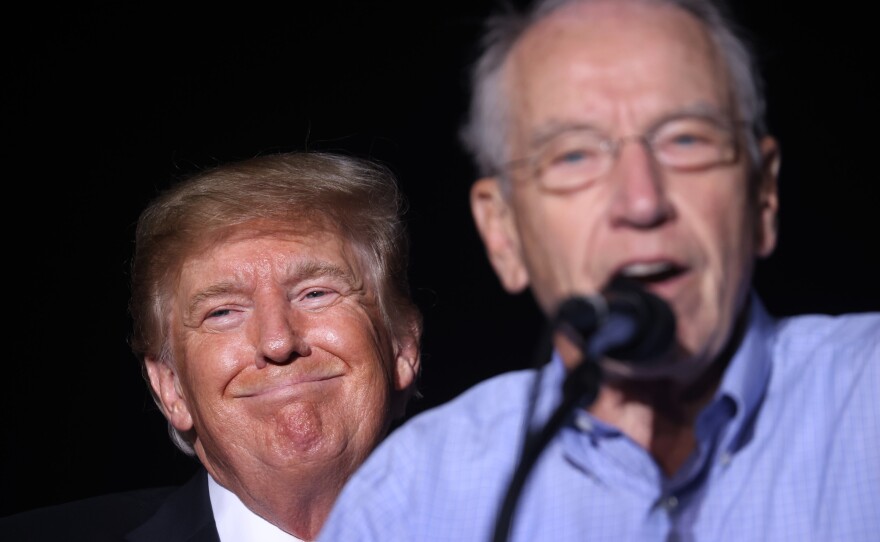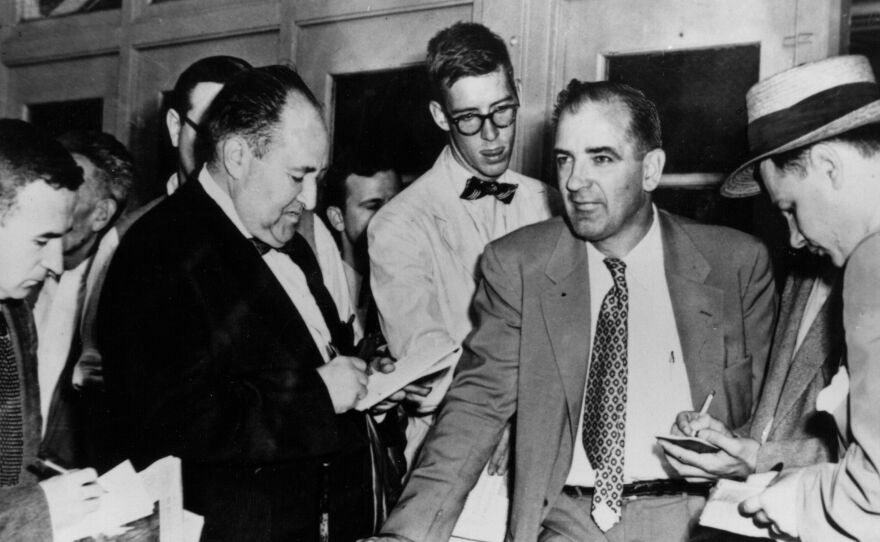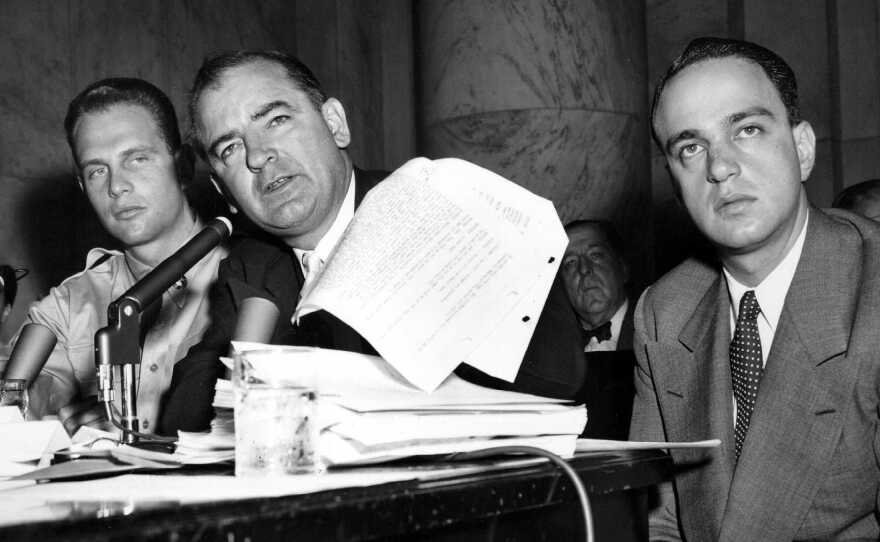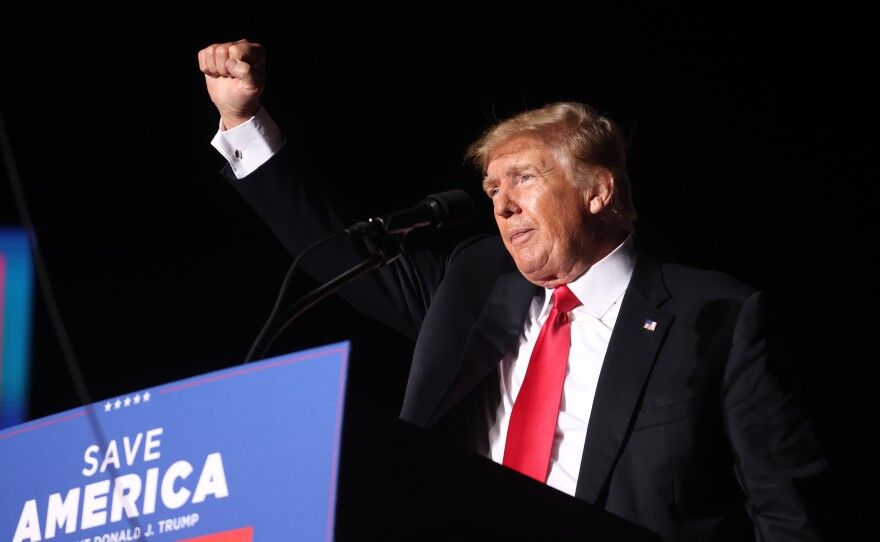The Republican Party has tackled countless controversies since its birth in the 1850s, but it is hard to find a precedent for the posture it finds itself in today.
Most of what Republicans espouse as a unified minority in Congress comes straight from the party's identical platforms for 2016 and 2020.
But a glaring new feature has been added to the party's agenda at the insistence of former President Donald Trump. Its adoption among Republican candidates and officeholders bespeaks his undiminished grip on the GOP's most passionate voters.
It is, of course, the idea that the 2020 election was somehow stolen — or at least that its true outcome remains somehow in question and should therefore be the central business before the nation.
That false notion lives on, despite most major news media having long since labeled it "the big lie." Perversely, one could argue, it lives on largely because so much of the media calls it that. But more of that in a moment.
While it may be without precedent, it's not without a parallel. There are distinct echoes today of the early 1950s, when false narratives about communism spreading in the U.S. gripped the Republican base because of one man with some personal connections to the Trump phenomenon: Sen. Joe McCarthy.
Trump's political ransom note
The baldest and most provocative presentation of Trump's demand to date appeared on his campaign website, Save America, on Oct. 13:
"If we don't solve the Presidential Election Fraud of 2020 (which we have thoroughly and conclusively documented), Republicans will not be voting in '22 or '24. It is the single most important thing for Republicans to do."
That statement from the former president suggests his party's leaders must match their priorities to his or face a mass defection by party loyalists — whom he plainly regards as Trump loyalists first.
Polls suggest Trump is not wrong about that, which explains the discomfort and deference of all those hamstrung Republican officials. They know better than anyone how beholden they are to Trump's troops. Every sounding of Republican opinion since the election shows that stark majorities have been convinced the election results weren't right.

And as the Senate's senior Republican, Chuck Grassley of Iowa remarked upon receiving Trump's endorsement this month for an eighth term: "If I didn't accept the endorsement of a person that's got 91% of Republican voters in Iowa, I wouldn't be too smart."
Not mentioned at the Trump-Grassley rally were the senator's remarks in February of this year criticizing Trump for the way "he belittled and harassed elected officials across the country to get his way. He encouraged his own, loyal vice president, Mike Pence, to take extraordinary and unconstitutional actions during the Electoral College count." At the time, Grassley called Trump's language regarding the election "extreme, aggressive, and irresponsible."
Grassley is far from alone. In recent weeks, Republican officials and candidates who once accepted the Electoral College results as certified by all 50 states have been adopting more of Trump's attitude and language.
Have we been here before?
There have certainly been other presidents in both major parties who were unhappy at being denied a second term. More than a few felt their defeat as a great injustice. There have also been nominees in either party who fell just short and had far stronger cases for casting doubt on the outcome — Republican Richard Nixon in 1960 and Democrat Al Gore in 2000, just to name two.
The nominees of the Democratic Party in 1824 and 1876 probably won more popular votes and Electoral College votes than anyone else in those years, but pitched disputes and months of negotiations installed someone else in the White House. In the first instance, first-time candidate Andrew Jackson nursed his grievance and used it to power a successful run four years later.
Another Democrat, incumbent Grover Cleveland, narrowly lost his home state of New York in 1888 and thereby lost his reelection. But Cleveland came back in 1892, won New York and served a second term.
Perhaps Trump might view Jackson or Cleveland as something of a model.
But what we have not seen is an incumbent president denying his defeat when losing by 7 million in the popular vote and 74 in the Electoral College and insisting on his version despite lack of evidence and the repeated rejection of his case by state officials and courts up to the U.S. Supreme Court, including some with judges he had appointed.
What Trump is asking his party to stake its future on is quite literally an unprecedented insistence on a demonstrably false assertion. But if there has been nothing quite like it, there have been other instances where a party has closed ranks in defending a false narrative promoted by a high-profile hero with uncommon appeal to a popular following.
As presidential historian Jon Meacham told NBC News in May 2018, Sen. Joe McCarthy "was never president" or nearly as powerful a figure as Trump, but McCarthyism is "the clearest analogy we have."
The man whose name became an "ism"
It is probably not possible for Americans today to fathom the impact Joseph R. McCarthy had on national politics seven decades ago in the darkest days of the Cold War. The Soviet Union had just gotten "the bomb," its first atomic weapon, largely through espionage. Half of Europe was under Soviet domination and the other half lived in its shadow. The Communist Party had taken over China.
Americans were wondering what had happened to their victory in World War II, half a decade earlier, and were genuinely fearful of what was often called "the global Red Menace."
McCarthy was at the time a first-term senator from Wisconsin. He had been the Senate's youngest member when he arrived in 1947, still in his 30s.
Early in 1950, looking ahead to a reelection campaign, McCarthy went on the road for the Republican Party with a speech about alleged communists working secretly deep in the State Department and elsewhere in the federal establishment. The speech in Wheeling, W.Va., would feature the utterly unsubstantiated statement that there were 205 communist "card-carrying members" or loyalists at the State Department — "names that were made known to the secretary of state." McCarthy said he had a list.
Pressed for the list, McCarthy never produced it. And the number of supposed Reds kept changing. The senator's secretary later told her brother, journalist David Brinkley, that McCarthy just "made it up."
But the press attention just kept getting bigger, unrestrained by the lack of proof. The term "McCarthyism" came to denote charges made without real basis but with much ballyhoo.
McCarthy soon became the sharpest thorn in the side of Democratic President Harry Truman and a leading attraction on the GOP fundraising dinner circuit. Although he never actually discovered any unexposed communists in Washington, he and others like him managed to sully the reputations of hundreds and even thousands of civil servants, academics and journalists. Many never recovered professionally; some committed suicide.
Many if not most of McCarthy's Republican peers in the Senate were appalled by his recklessness. As early as 1950, his Republican colleague Margaret Chase Smith of Maine took to the floor to issue her "Declaration of Conscience" and denounce McCarthy's deceits.
"It is high time that we all stopped being tools and victims of totalitarian techniques — techniques that, if continued here unchecked, will surely end what we have come to cherish as the American way of life," she said.
A false narrative with a compelling narrator
At the time, however, only six of her party colleagues were with her in public. Few Republicans of the day shared McCarthy's manic, showy vigilantism, but even fewer were willing to cross him at a time when he had wider public support in their home states than they did.
They knew the media had become suspicious of McCarthy's wild accusations and conspiracy theories. But the GOP was pressing toward a close election in the midterms of 1950 and was desperate to dislodge the Democrats from the White House in 1952. McCarthy and his "communists in government" accusations were crucial to both campaigns, and for a time he was even mentioned as a prospective vice president.
The Republicans' 1952 presidential nominee, however, would be the World War II hero Gen. Dwight D. Eisenhower, who had little use for McCarthy and who chose as his running mate Richard Nixon of California, another first-term senator with a strong anti-communist resume. McCarthy had to settle for reelection and the chairmanship of a key Senate investigation subcommittee.
In that role, McCarthy reached the height of his power, fame and falsehoods. His crusade culminated in his clash with the Defense Department over the promoting of a leftist Army dentist. The televised hearings posed McCarthy against generals and cast him in an unflattering light, as did a rising tide of negative media attention. He would be censured by his colleagues finally in 1954 by a crushing vote of 67-22. After that he largely withdrew from public view and died three years later at 48.

But McCarthy's impact did not disappear. Biographer Larry Tye notes in his 2020 book, Demagogue: The Life and Long Shadow of Senator Joe McCarthy, that a Gallup poll taken after the censure in 1954 found that 34% of voters still approved of McCarthy. Tye quotes George Gallup himself saying at the time, "Even if it were known that McCarthy had killed five innocent children, [his supporters] would probably still go along with him."
Tye notes that the essential tactic of McCarthy also lived on, saying the senator had "learned early that there was no worse a penalty for a big lie than for a little one, but that only the big ones drew a crowd, so he told whoppers."
Another "ism" is born
Beverly Gage, a professor of history and American studies at Yale University, is the author of a remarkably prescient essay published a month after the 2020 election in The Washington Post. In it, Gage noted that senators of both parties had hoped to bring an end "not only to McCarthy's personal reign of terror but to the broader phenomenon of McCarthyism" when they censured him in 1954.
Gage argued late in 2020 that Trump's adversaries were hoping his election defeat would achieve something similar, driving a stake through the heart of Trumpism.
"But the afterlife of McCarthyism is not nearly as clear-cut — or as comforting for Trump opponents — as the legend might suggest," she wrote.
Instead, Gage notes, a cult of McCarthy defenders grew up in the years after his death, led by National Review editor-publisher William F. Buckley and others who saw McCarthy as a victim of the East Coast leftist elite and a martyr to the unfairness of the establishment national media.
In an interview this past week, Gage added: "Ultimately, even when the [Republican] party appeared to be repudiating McCarthy himself, the politics and the people who viewed McCarthy as a victim actually went on to rebuild the party in an image that was much more friendly to McCarthy's appeal."
That can be seen happening now, she adds: "It's very similar, even though obviously Trump was much more powerful than McCarthy ever was. It's another case of people seeing political advantage in something they might not actually condone."
To some degree, Gage contends, this movement influenced the founding of the John Birch Society in the late 1950s and survived in the movements of Republican presidential nominees — Barry Goldwater in 1964 and Nixon in 1968. A later variant emerged in the persona of Ronald Reagan.
"In that sense, you can say McCarthy wins in the long run, even if he himself is long gone."
The personal connection

In the post-Reagan era, the Republican Party produced two presidents named George Bush and three other unsuccessful nominees from the party's center. Then along came Donald Trump — a man with multiple connections to McCarthy.
On the personal level, as both Gage and Meacham have noted, there was the legendary lawyer Roy Cohn, a legal adviser to the Trump family for decades who had begun his career as an investigator for McCarthy's subcommittee in the early 1950s. Trump has often spoken of Cohn as his ideal of an attorney, utterly devoted to him as a client, concerned with nothing but winning.
In the end, both McCarthy and Trump were puzzles for other power figures in the Republican Party because their phenomenal success seemed so improbable as to be inexplicable. Both got a grip on base voters and American conservatives that defied their seeming limitations and glaring contradictions.
The power of McCarthyism and Trumpism is such that it will survive the men themselves. Trump's followers are at least as likely to remain focused on him as were McCarthy's, as Gage wrote in December:
"Today's Republican establishment may ultimately repudiate the man who has held it in thrall — and in fear — for four-plus years. But it is Trump's base, and their interpretation of his ouster from Washington, that will determine the future of Trumpism."
Copyright 2021 NPR. To see more, visit https://www.npr.org. 9(MDAzMjM2NDYzMDEyMzc1Njk5NjAxNzY3OQ001))







